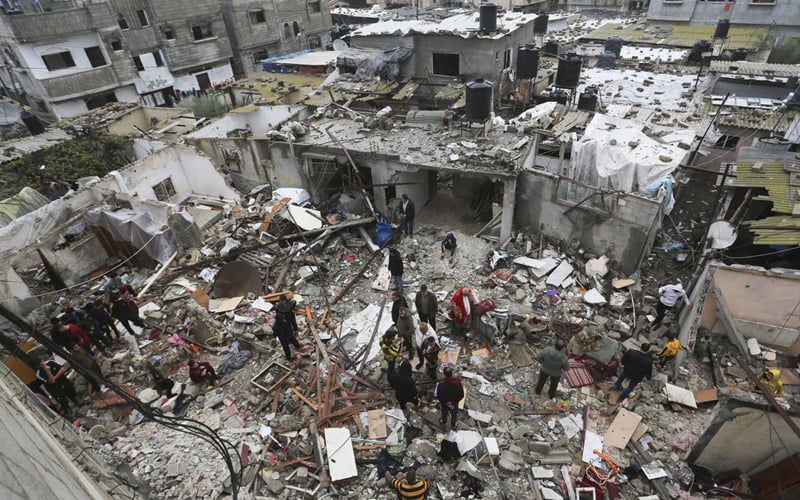
From Zalina Ismail
Each year, on Nov 29, the United Nations observes the International Day of Solidarity with the Palestinian People.
The date was chosen because on that day in 1947, the General Assembly adopted resolution 181 (II), which came to be known as the Partition Resolution.
That resolution provided for the establishment in Palestine of a “Jewish State” and an “Arab State”, with Jerusalem as a corpus separatum under a special international regime.
More than 27 years later, in 1974, United Nations General Assembly Resolution 3236 recognised the inalienable rights of the Palestinian people to self-determination, national independence and sovereignty in Palestine.
Yet, today, after 76 years of this resolution for the creation of two states, only one, Israel, has come into being.
That is why each year the International Day of Solidarity with the Palestinian People provides an opportunity for the international community to show its support for the Palestinian dream of a peaceful future; a dream that seems increasingly unattainable.
What you or I think will most certainly have very little or no impact on the immediate future of those in the Gaza Strip. It saddens me to say that my reality is so far removed from those in Gaza.
Is this genocide?
In the late 60s, I watched a movie called “Judgment at Nuremberg” that was based on the post-World War II Nuremberg trials of former Nazi leaders.
It is a film that deals with the atrocities of the Holocaust, a complex tale of morality, injustice and war, hopelessness and double standards. I thought “never again will this ever happen”. I was wrong, because “never again” is now.
According to trtworld.com, Israel’s ongoing war with Gaza has killed at least 15,000 Palestinians, including 6,150 children and more than 4,000 women, while more than 7,000 people are still under the rubble, including 4,700 children and women. This feels too much like the Nuremberg movie. Is this genocide?
According to the UN Genocide Convention, genocide is a crime that can take place both in time of war as well as in time of peace.
The definition contained in Article II of the Convention describes genocide as a crime committed with the intention of destroying a national, ethnic, racial or religious group, in whole or in part, such as:
- killing members of the group;
- causing serious bodily or mental harm to members of the group;
- deliberately inflicting on the group conditions of life calculated to bring about its physical destruction in whole or in part;
- imposing measures intended to prevent births within the group;
Does this sound like the conflict in Gaza? Is this genocide? You be the judge.
International humanitarian law
Modern day rules of war or the International Humanitarian Law (IHL) seeks to limit the effects of armed conflict and minimise suffering.
It tries to do the impossible: find a compromise between military and humanitarian imperatives where military necessity must always be balanced against considerations of humanity. Are the principles of IHL active in Gaza?
When Israeli defence minister Yoav Gallant ordered a “complete siege” of the Gaza Strip, he said “no electricity, no food, no fuel, everything is closed. We are fighting human animals and we are acting accordingly”. In saying this, he has classified every single Palestinian in Gaza as an animal who, therefore, does not possess human rights. Above all, he is saying they are dispensable.
He is following the Dahiya Doctrine which endorses the use of “disproportionate force” and the destruction of civilian infrastructure in areas where attacks against Israel originate. Is this a legal use of force in an armed conflict?
Similarly, the IDF uses the Hannibal Directive to prevent the capture of Israeli soldiers by enemy forces. According to one version, it says that “the kidnapping must be stopped by all means, even at the price of striking and harming our own forces”.
It is interesting to note that the doctrine is named after Hannibal, the Carthaginian general, who is said to have preferred suicide by poison rather than being taken prisoner by his Roman enemies. Is this a legal use of force in an armed conflict? Are the principles of IHL active in Gaza?
How can we even begin to find a compromise between military and humanitarian imperatives in Gaza?
From the river to the sea…
When a Palestinian says “from the river to the sea, Palestine will be free”, it creates such an emotional outburst as to the perceived inherent antisemitism in the person. It led the US House of Representatives to censure Rashidah Tlaib, one of its members who invoked it, and Columbia University to shut down two student organisations whose members repeated it.
This contrasted greatly with the speech which Prime Minister Benjamin Netanyahu gave before the United Nations General Assembly on Sept 22, 2023, when he held up a map that showed Israel stretching “from the river to the sea”. And that “between the sea and Jordan there will only be Israeli sovereignty”.
How does this reconcile with the UN General Assembly Resolution 3236 which recognises the inalienable rights of the Palestinian people to self-determination, national independence and sovereignty in Palestine?
Clearly, the gulf between the two warring factions is wider than the Sea of Galilee.
As we celebrate the 46th International Day of Solidarity with the Palestinian People, we need to remember that Bertrand Russell said: “War does not determine who is right, only who is left”.
At the rate we are going, there may soon be no one left by the time we celebrate this day for the 47th time in 2024.
Zalina Ismail is a former professor of Universiti Sains Malaysia.
The views expressed are those of the writer and do not necessarily reflect those of MMKtT.



No comments:
Post a Comment
Note: Only a member of this blog may post a comment.